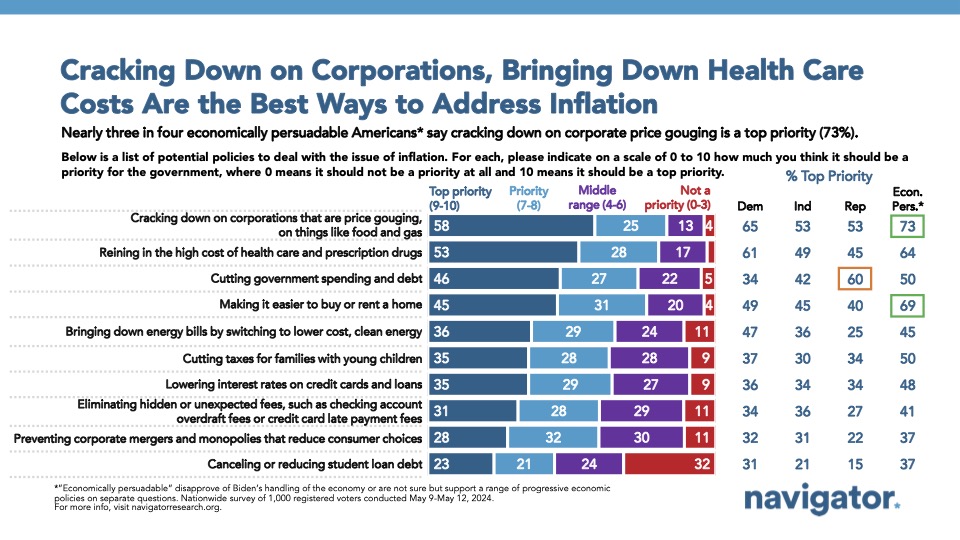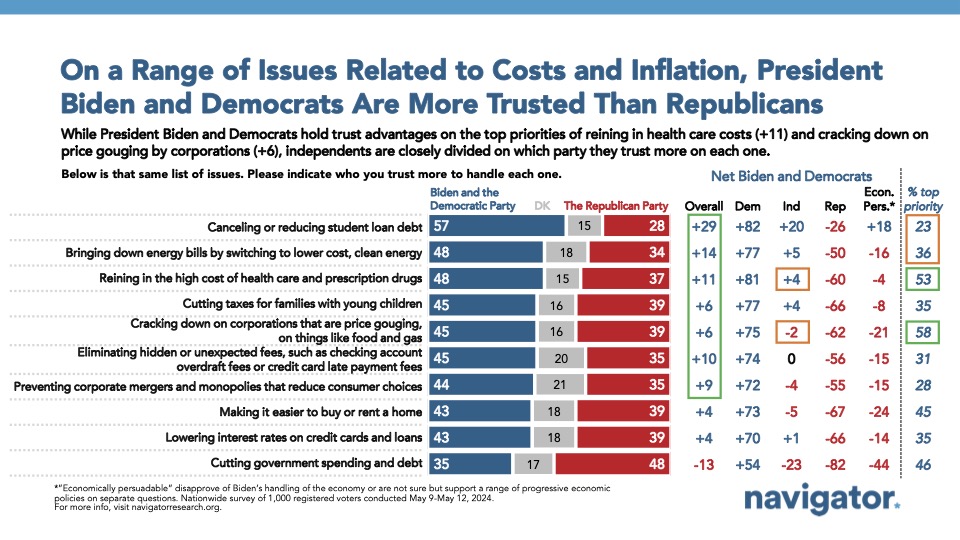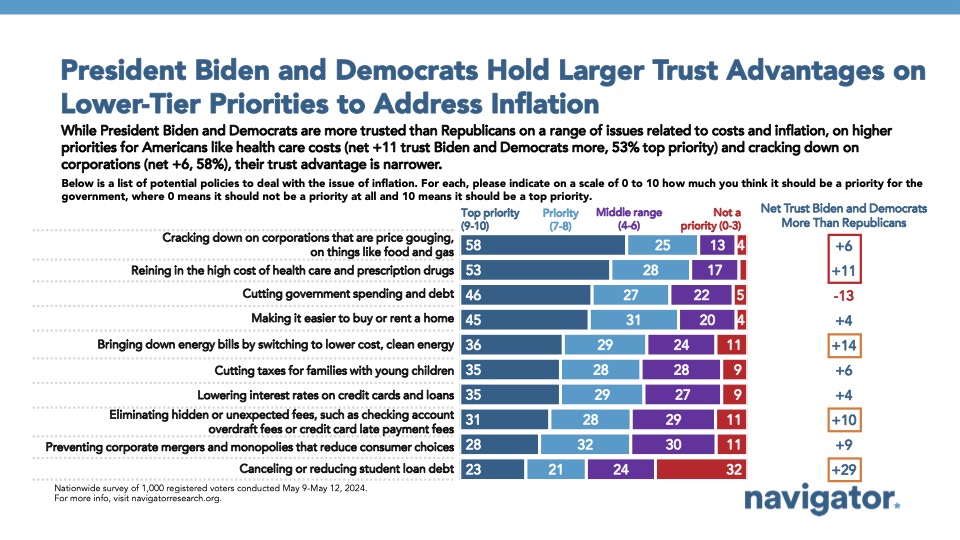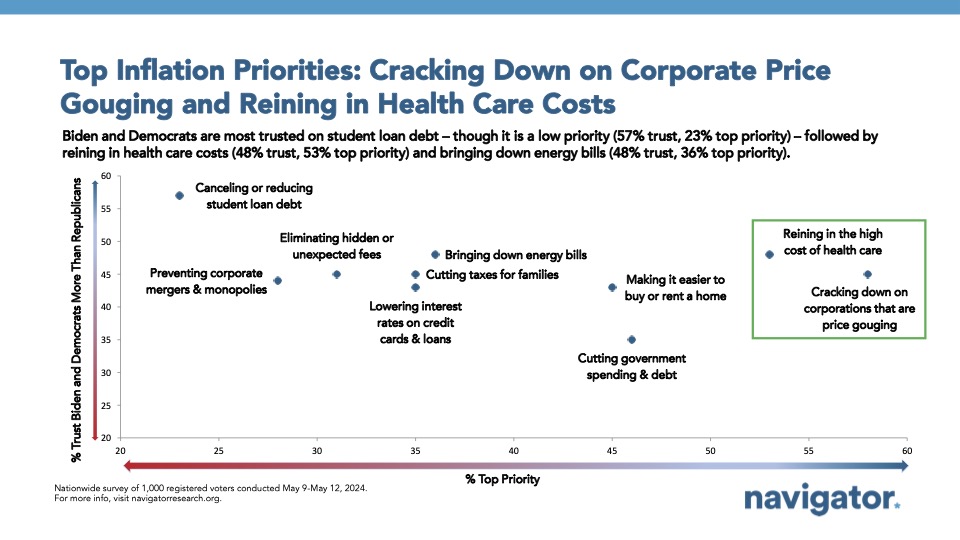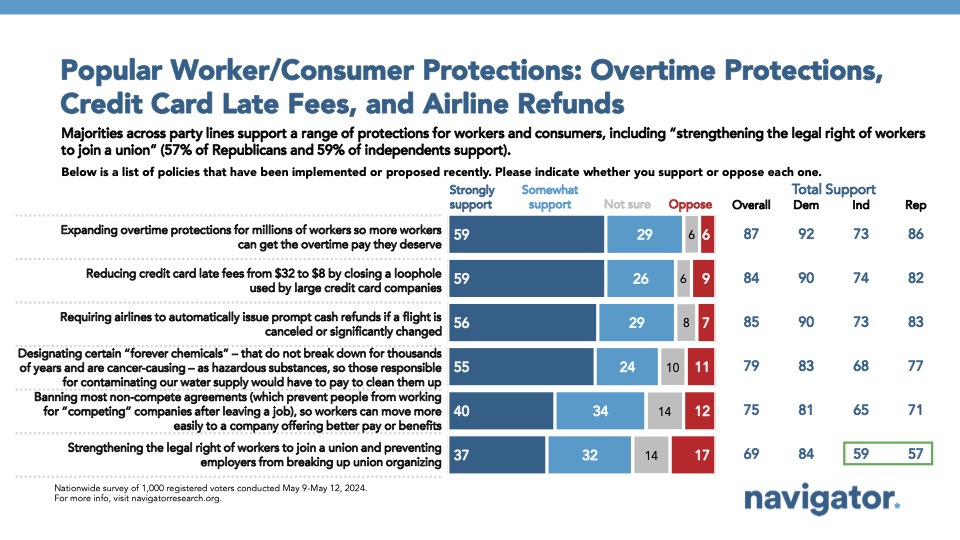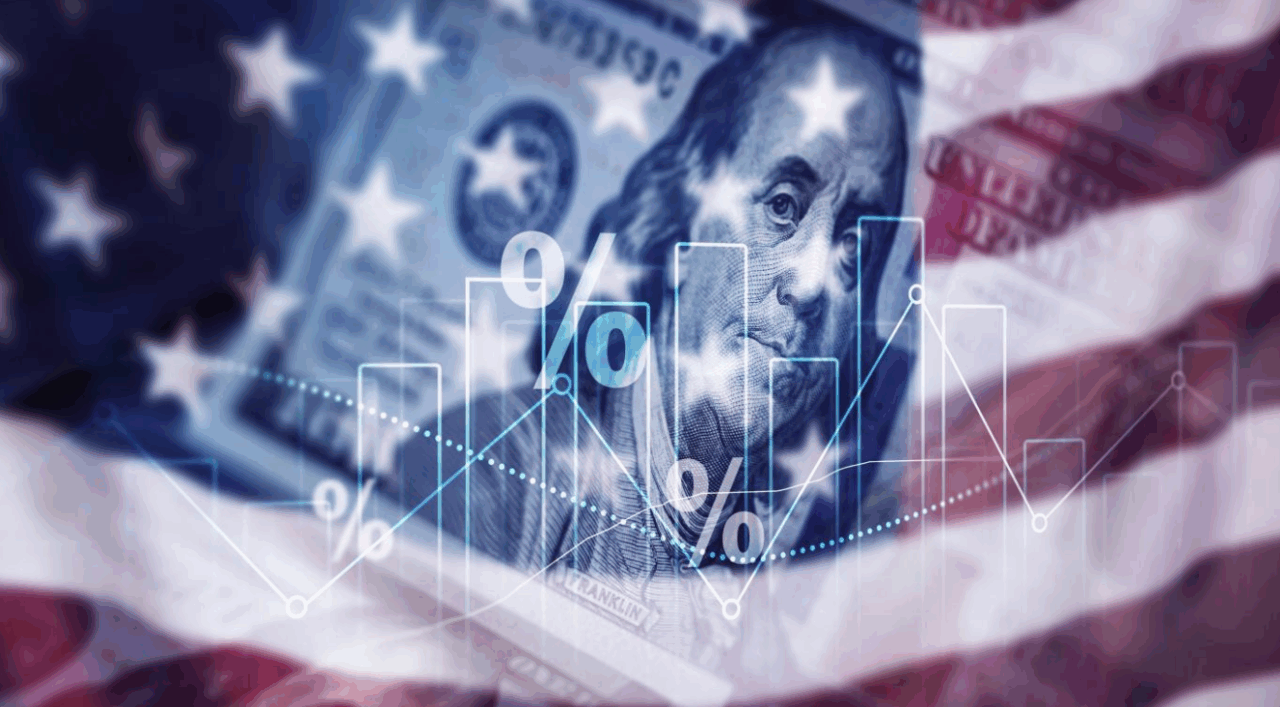Poll: Corporate Greed, Price Gouging, and Inflation
This Navigator Research report contains polling data on priorities Americans believe the government should be focused on to deal with the issue of inflation, which party is more trusted to handle these issues, and support for recent labor and consumer protection actions implemented or proposed by the Biden administration.
Americans’ top priorities for the government to deal with inflation are cracking down on price-gouging corporations and reining in health care costs.
More than four in five Americans believe that “cracking down on corporations that are price gouging, on things like food and gas” should be a priority for the government to deal with inflation (83 percent), including nearly three in five who say it is a top priority (58 percent rate it as a 9 or 10 on a 0-10 scale of priority). A similar share also believe “reining in the high cost of health care and prescription drugs” should be a priority for the government (81 percent), including over half who believe it should be a top priority (53 percent).
- Among economically persuadable Americans — defined as those who disapprove of President Biden’s handling of the economy, but are supportive of all of the labor and consumer protections implemented or proposed by his administration — 95 percent consider cracking down on corporations that are price gouging, including 73 percent who believe this is a top priority for the government to deal with inflation (73 percent).
President Biden and Democrats hold party trust advantages on addressing corporate greed, reducing health care costs, and lower-tier priorities to deal with inflation.
More Americans trust President Biden and Democrats in Congress more than Republicans to crack down on corporate price gouging and rein in health care and prescription drug costs. By 6 points, Biden and Democrats are more trusted to crack down on corporations that are price gouging (45 percent Biden/Democrats – 39 percent Republicans), though 16 percent don’t know enough to say which party to trust more. Among independents, trust is more split (net -2; 27 percent Biden/Democrats – 29 percent Republicans, with a 44 percent plurality who don’t know enough to say). Biden and Democrats have a larger 11-point trust advantage when it comes to reining in the cost of health care and prescription drugs (48 percent Biden/Democrats – 37 percent Republicans), though independents remain similarly split (net +4; 29 percent Biden/Democrats – 25 percent Republicans, with a 46 percent plurality who don’t know enough to say).
- Republicans hold a double-digit trust advantage over Biden and Democrats on “cutting government spending and debt” (35 percent Biden/Democrats – 48 percent Republicans), which ranks as the third-highest priority behind cracking down on corporate greed and reining in health care costs (73 percent rate as a priority; 46 percent rate as a top priority).
- Biden and Democrats hold even larger trust advantages over Republicans on a number of lower-tier government priorities, including a 29-point advantage on “canceling or reducing student loan debt” (57 percent Biden/Democrats – 28 percent Republicans), a 14-point advantage on “bringing down energy bills by switching to lower cost, clean energy” (48 percent Biden/Democrats – 34 percent Republicans), and a 10-point advantage on “eliminating hidden or unexpected fees, such as checking account overdraft fees or credit card late payment fees” (45 percent Biden/Democrats – 35 percent Republicans).
More than three in four Americans support a variety of recent labor and consumer protection actions from the Biden administration.
Nearly nine in ten Americans support “expanding overtime protections for workers so they can get the overtime pay they deserve” (net +81; 87 percent support – 6 percent oppose), including 59 percent who “strongly” support this. More than four in five Americans also support “requiring airlines to automatically issue cash refunds if a flight is canceled or significantly changed” (net +78; 85 percent support – 7 percent oppose) and “reducing credit card late fees from $32 to $8 by closing a loophole used by large credit card companies” (net +75; 84 percent support – 9 percent oppose).
- Other widely supported consumer protections include “designating certain ‘forever chemicals’ — that do not break down for thousands of years and are cancer-causing — as hazardous substances” (net +68; 79 percent – 11 percent oppose), “banning most non-compete agreements (which prevent people from working for ‘competing’ companies after leaving a job)” (net +63; 75 percent – 12 percent oppose), and “strengthening the legal rights of workers to join a union and preventing employers from breaking up union organizing” (69 percent).
- Those living in union households or working in the service industry are even more likely to support many of these policies, including banning non-compete agreements (80 percent support among those in union households, 79 percent support among those working in the service industry) and strengthening the legal right of workers to join a union (77 percent support among those in union households, 75 percent support among those working in the service industry).
About The Study
Global Strategy Group conducted a public opinion survey among a sample of 1,000 registered voters from May 9-May 12, 2024. 100 additional interviews were conducted among Hispanic voters. 72 additional interviews were conducted among Asian American and Pacific Islander voters. 100 additional interviews were conducted among African American voters. 100 additional interviews were conducted among independent voters. The survey was conducted online, recruiting respondents from an opt-in online panel vendor. Respondents were verified against a voter file and special care was taken to ensure the demographic composition of our sample matched that of the national registered voter population across a variety of demographic variables.

